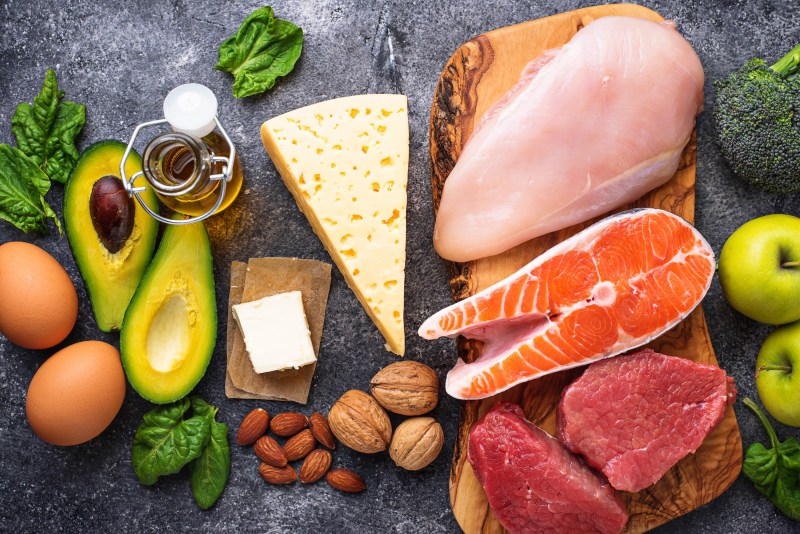For weight loss to be more effective, you have to pay attention to your diet. As a trainer, I have had clients who were convinced that getting to the gym every day was all they needed to do to see results, but the truth is that what you eat is as important as how often you exercise. This is because trying to lose weight on a bad diet may only cause stagnancy.
According to Laura Goldberg, M.D., “The power of regular exercise to counter the negative effects of poor eating habits is limited, especially when looked at over the long term.” In essence, you can’t out-train a bad diet.
Over time, experts have developed eating patterns or diet plans that can help remedy bad diets by conditioning your body for weight loss. Some of these diet plans claim to target stored fat and tend to promote overall health. Two of these popular diet plans are the keto and carnivore diets. Which is right for you? Let’s dive into the keto vs. carnivore debate.
What is the keto diet?

The ketogenic diet is a low-carb, high-fat eating method that influences your body to burn fat for energy, leading to weight loss. Usually, your body burns carbs for energy, but the idea behind the keto diet is that by reducing your carb intake and increasing your consumption of healthy fats, your body will have no other choice than to burn stored fat. This state is known as ketosis.
The general instruction for those following a keto diet is to consume less than 50 grams of carbs daily. Some people will choose to go as low as 20 grams. Also, protein consumption should be moderate in relation to how you consume fats and carbs. To be more specific, your daily calorie intake will look like about 70% to 80% fat, 10% to 20% protein, and 5% to 10% carbs.
While there is no one-size-fits-all rule on what to eat on a ketogenic diet, foods such as almonds, peanuts, shellfish, coconut, olive oil, and cheese may suffice. Meanwhile, anti-keto foods include unhealthy fats, sugary foods, grains, beans, and alcohol.
Before you begin your keto journey, it would be best to consult with a dietician or wellness expert for proper guidance on meal strategies and assessment of potential risks.
What is the carnivore diet?

The carnivore diet, also known as a zero-carb or restrictive diet, is a type of keto diet. Like keto, the aim is to influence the body to burn fat for energy instead of the glucose that is received through carbs. However, as mentioned, the carnivore diet is restrictive. You are only allowed to consume animal products, such as fish, meat, beef, pork, eggs, dairy products, and chicken. Meanwhile, you’d need to remove seeds, nuts, grains, fruits, and even vegetables from your diet as you are only focusing on animal products. This naturally makes it a low-carb diet.
Like keto, experts believe that the carnivore diet goes beyond weight loss. There are claims that it can help regulate the blood sugar of people with type 2 diabetes and even reduce inflammation as the diet focuses on cutting out inflammatory foods.
A typical carnivore meal plan will involve eating animal products and their variations for breakfast, lunch, and dinner. For example, you may decide to eat eggs and bacon in the morning, skip the afternoon meal, and then eat a large portion of chicken or salmon at night.
Again, remember to consult with a dietician or physician before hopping on the carnivore diet. It’s important so they can properly advise you regarding the potential benefits and meal plans and assess how the diet may affect your overall health.
Pros and cons of the keto diet

Pros
The keto diet can help you lose weight
A study focusing on reducing insulin secretion in people with obesity manually found that it can lead to weight loss. However, it is costly. Hence, the researchers agreed that adopting a natural method through the keto diet can reduce blood glucose levels, which in turn, reduces insulin and encourages weight loss. In addition, the study found that a low-carb diet is more effective in reducing hunger pangs than a low-fat diet.
The keto diet is helpful with diabetes
This is because the keto diet reduces blood glucose, which also lowers insulin levels. So, some people with diabetes can achieve diabetes remission by following a high-fat, low-carb diet like keto.
The keto diet can fight cancer
Besides lowering your insulin levels, which is helpful for cancer, there are claims that keto can starve cancer cells to death because they thrive on glucose to operate effectively.
Cons
Nutrient deficiency
Drastically reducing carbs to less than 50 grams and prioritizing only healthy fats leaves room for deficiency of important vitamins and minerals that come from fruits and vegetables. These nutrients play vital roles in keeping your body healthy.
Heart complications
The American Heart Association advises people to reduce saturated fat intake to within 5% to 6%. However, a high-fat diet like keto involves consuming a lot of saturated fats, which can increase the risks of heart complications.
It may be hard to follow
While keto is OK for the short term, the followers may find it daunting as a long-term plan due to the restrictions involved.
Pros and cons of the carnivore diet

Pros
Weight loss
Like keto, the carnivore diet is restrictive. It eliminates carbs, sugar, processed foods, and unhealthy fats, and this can encourage weight loss.
Regulates blood sugar
Since the carnivore diet is strict on total carb elimination, blood sugar and insulin levels may reduce as carbs have a high impact on them.
Improves mental well-being
By eliminating foods associated with poor mental well-being, like processed foods and junk, the carnivore diet can promote a better mood.
Cons
It is restrictive
The carnivore diet eliminates many foods that contain essential nutrients and focuses on only animal produce. This tends to deprive your body of vital vitamins and minerals for proper growth.
Heart complications
Like keto, the carnivore diet is high in saturated fat, and consuming too much of it can cause heart issues over time.
Digestive health issues
The diet lacks fiber, which helps regulate the digestive system. This can lead to constipation and related digestive problems.
Keto vs. carnivore diet: Should you follow either one?

This will depend on your weight loss goals and your dietician’s assessment. If it’s a short-term goal, then the carnivore diet might be better. Experts will most likely recommend the keto diet for the long term, since it offers a wider range of nutritional options than the carnivore diet, making it more sustainable. The former strictly recommends eliminating any plant-based foods and sticking to animal produce. Meanwhile, the latter has a comprehensive breakdown of what should constitute your daily calorie intake in terms of fats, protein, and carbs.
Frequently asked questions

Is the keto or carnivore diet healthier?
The keto diet is healthier because it allows you to consume a wider range of nutrients than the carnivore diet.
Does the carnivore diet put you into ketosis?
Yes, it can. Since it’s a zero-carb and fat-based diet, it encourages your body to look to stored fat for an alternative source of fuel for energy.
What do cardiologists think of the carnivore diet?
While some think eating only meat does more good than harm, many cardiologists fear that the carnivore diet can increase LDL cholesterol over time. This increases your risk of heart complications, as meat is filled with saturated fat.




